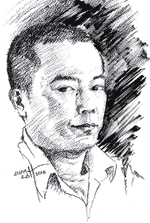
COMMENTARY
| By YENI | Monday, November 1, 2010 |
Whenever someone says that Burma's Nov. 7 election will bring about future political change, I am prompted to respond using the following words of Amartya Sen, the Indian Noble Prize winning economist:
 |
| Yeni is news editor of the Irrawaddy magazine. He can be reached at [email protected]. |
Developments taking place in the run-up to the election—a time which many observers anticipate will be rife with electoral fraud committed by the regime and its proxy, the United Solidarity and Development Party (USDP)—appear to support Sen’s insightful comment.
Burmese citizen journalists are reporting difficulty in sending information outside of Burma as Internet connections are slowing or failing. Undoubtedly, the “Internet slowdown” is part of the Burmese regime's strategy to tightly control the flow of information during the pre- and post-election news cycles.
In 2007, when thousands of young Buddhist monks peacefully protested against the military regime, the ruling Burmese generals pulled the plug on Internet services in a bid to prevent the outside world from knowing the full extent of their brutal suppression of the September demonstrations.
This time—in a move that directly contradicts the definition of a transparent and democratic electoral process—Burma’s Ministry of Post and Telecommunications (MPT) has blocked Internet access by the Internet cafes where tech-savvy Burmese chat on G-talk, check out social-networking sites such as Facebook, surf exiled Burmese websites and blogs and even share information about how to slip past the regime’s Internet censor by using proxy servers.
As a result, daily Internet users said that most Internet cafes in Burma’s major cities, including Rangoon and Mandalay, have shut down their daily operations.
In contrast, sources close to Burma’s Internet infrastructure have confirmed to The Irrawaddy that Internet access provided by MPT is normal at all government and military institutions. Given that the government and military share the SEA-ME-WE-3 undersea cable connection and a satellite connection with Bagan Cybertech (later known as Myanmar Teleport), the regime-controlled company that provides service to most of the Internet cafes, it is clear the cafes have been targeted.
The regime's effort to control Internet access by private businesses such as Internet cafes also provides another example of the military government's hostility toward Burma's technology savvy new generation, who the generals know are using the Internet along with cell phones and digital cameras to monitor and report on the election.
In addition, the “Internet slowdown” comes only days after the junta attempted to suppress information about Cyclone Giri, a category 4 cyclone that hit the country’s west coast on Oct. 22.
According to a report by the UN Office for the Coordination of Humanitarian Affairs, more than 175,000 people have been affected by the cyclone, with about 70,795 people made homeless. The storm also destroyed schools and government buildings and caused severe damage to the region's infrastructure, including roads, bridges, electricity and drinking water. Landslides caused trees and electricity poles to collapse, cutting communications in several areas, and transportation and communications remain difficult.
While the regime has downplayed the death toll and the scale of the destruction—and at the same time slowed Internet access—Burma’s notorious censorship board, the Press Scrutiny and Registration Division, has not allowed the local newspapers to report freely on the storm, much less the election.
These latest efforts by the junta to control the flow of information and access to free media— a move which denies Burmese citizens the fundamental freedoms of expression, peaceful assembly and association—are one more reason to conclude that the so-called “election” on Nov.
1 | 2 
|
||
|
||
|
||
|
||
|
||
|
||


Thailand Hotels
Bangkok Hotels
China Hotels
India Hotels

|